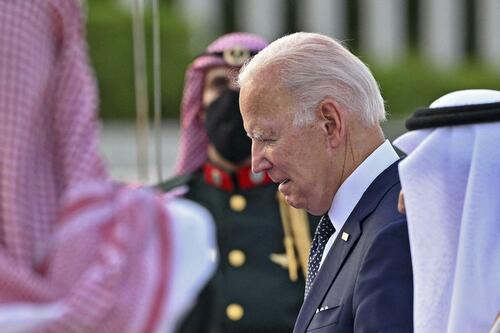
The head of the American Enterprise Institute says US-Saudi relations are "likely unrecoverable," after the White House 'personalized' last week's OPEC+ decision to cut production, according to an expert cited by Bloomberg.
"They’ve once again personalized the problem, which will lead to another humiliating climbdown when they need something from Saudi Arabia," said Kori Schake, director of foreign and defense policy studies at the American Enterprise Institute, of the US position. "They’d have been smarter to have pointed out that Saudi Arabia frequently refuses US requests to use oil as a policy tool, when the Saudi economy is wholly reliant on it and has an overriding interest in price stability."
"The relationship is likely unrecoverable," Schake added.
The analysis comes after dueling statements from Washington and Riyadh in recent days over the OPEC+ cut, which underscores how bad the deteriorating relationship has been between the two countries which are now accusing each other of acting in bad faith.
Saudi Arabia said the cuts were an attempt to ease market volatility, and lectured that relations with the US must be built on trust. A White House statement on Thursday sneered at Saudi Arabia’s attempt to “spin or deflect,” and Secretary of State Antony Blinken echoed Biden’s warnings that the decision would have “consequences.”
The remarkably public contretemps reflects brewing impatience within the White House now that it has little to show for Biden’s outreach to the Saudis -- which he was compelled to make as gasoline prices soared over the summer, despite his campaign promise to treat Crown Prince Mohammed bin Salman as a “pariah.” -Bloomberg
One Saudi official said there's a serious sense of grievance that the US abandoned the Kingdom during periods of low oil prices, only to turn around and expect help now that it wants to keep prices from rising ahead of next month's midterm elections.
Another Gulf official insisted that the oil production cut is more about balancing supply and demand - and serving their own economies while trying to minimize international harm.
Current and former officials on both sides insist that Washington and Riyadh 'fundamentally misunderstand each other,' with one saying that there was dismay over the White House's angry response - suggesting that the Biden administration should have instead taken the high road.
As such, the only hope for restoring relations is the fact that neither side wants to sever security and energy ties - as the two countries have a long history of intelligence-sharing. The Saudis also house what US officials say are a 'significant number' of Patriot anti-missile interceptors sent to Saudi Arabia in May.
Despite some calls in Congress to curb Saudi purchases of US weapons, the administration is pushing back against any restrictions on arms sales to the kingdom, said Scott Modell, managing director of Rapidan Energy Group. However dissatisfied the Saudis may be with delays in delivery of US weapons or assistance due to the war in Ukraine, “they have to grin and bear it” because there’s no substitute for the US when it comes to defense and security, he said.
For now, though, talk in the US is of punishment, not rapprochement. Officials say Biden is weighing his options for how best to respond. -Bloomberg
Getting litigious
One option the US is considering to punish Saudi Arabia is a bill known as NOPEC - which would enable the US to sue OPEC producers for energy market manipulation. We suppose this only counts in directions that benefit the US - which plans to drain the US strategic reserves by at least 165 million barrels of crude through November to combat rising prices. Bloomberg notes that Biden could release more reserves to try and drive prices down even more.
And what about arms sales?
"For us at this moment to have a longstanding partner like Saudi Arabia help Russia fund their war of aggression against Ukraine was a very bitter disappointment and a big surprise," said Sen. Chris Coons (D-DE) in a Friday statement to CNN. "I think you’ll see both the administration and the Senate take action, and one of the most likely actions is to stop any future arms sales."
The report notes that Saudi Arabia's military is 75% composed of US equipment, which includes fighter jets, according to senior Brookings fellow Bruce Riedel.
If the US does end arms sales, it would mark a 'whipsaw in policy' for the Biden administration - which has generally loosened restrictions despite its rhetoric against the Kingdom.
"I can’t imagine a greater humiliation -- both in terms of his domestic political standing, and his efforts on unity in the international arena on Ukraine and Russia -- than what MBS did" to Biden, said Carnegie Endowment for International Peace senior fellow Aaron David Miller. "At a minimum, he didn’t really care what the impact was for Joe Biden."
The head of the American Enterprise Institute says US-Saudi relations are “likely unrecoverable,” after the White House ‘personalized’ last week’s OPEC+ decision to cut production, according to an expert cited by Bloomberg.
“They’ve once again personalized the problem, which will lead to another humiliating climbdown when they need something from Saudi Arabia,” said Kori Schake, director of foreign and defense policy studies at the American Enterprise Institute, of the US position. “They’d have been smarter to have pointed out that Saudi Arabia frequently refuses US requests to use oil as a policy tool, when the Saudi economy is wholly reliant on it and has an overriding interest in price stability.”
“The relationship is likely unrecoverable,” Schake added.
The analysis comes after dueling statements from Washington and Riyadh in recent days over the OPEC+ cut, which underscores how bad the deteriorating relationship has been between the two countries which are now accusing each other of acting in bad faith.
Saudi Arabia said the cuts were an attempt to ease market volatility, and lectured that relations with the US must be built on trust. A White House statement on Thursday sneered at Saudi Arabia’s attempt to “spin or deflect,” and Secretary of State Antony Blinken echoed Biden’s warnings that the decision would have “consequences.”
The remarkably public contretemps reflects brewing impatience within the White House now that it has little to show for Biden’s outreach to the Saudis — which he was compelled to make as gasoline prices soared over the summer, despite his campaign promise to treat Crown Prince Mohammed bin Salman as a “pariah.” -Bloomberg
One Saudi official said there’s a serious sense of grievance that the US abandoned the Kingdom during periods of low oil prices, only to turn around and expect help now that it wants to keep prices from rising ahead of next month’s midterm elections.
Another Gulf official insisted that the oil production cut is more about balancing supply and demand – and serving their own economies while trying to minimize international harm.
Current and former officials on both sides insist that Washington and Riyadh ‘fundamentally misunderstand each other,’ with one saying that there was dismay over the White House’s angry response – suggesting that the Biden administration should have instead taken the high road.
As such, the only hope for restoring relations is the fact that neither side wants to sever security and energy ties – as the two countries have a long history of intelligence-sharing. The Saudis also house what US officials say are a ‘significant number’ of Patriot anti-missile interceptors sent to Saudi Arabia in May.
Despite some calls in Congress to curb Saudi purchases of US weapons, the administration is pushing back against any restrictions on arms sales to the kingdom, said Scott Modell, managing director of Rapidan Energy Group. However dissatisfied the Saudis may be with delays in delivery of US weapons or assistance due to the war in Ukraine, “they have to grin and bear it” because there’s no substitute for the US when it comes to defense and security, he said.
For now, though, talk in the US is of punishment, not rapprochement. Officials say Biden is weighing his options for how best to respond. -Bloomberg
Getting litigious
One option the US is considering to punish Saudi Arabia is a bill known as NOPEC – which would enable the US to sue OPEC producers for energy market manipulation. We suppose this only counts in directions that benefit the US – which plans to drain the US strategic reserves by at least 165 million barrels of crude through November to combat rising prices. Bloomberg notes that Biden could release more reserves to try and drive prices down even more.
And what about arms sales?
“For us at this moment to have a longstanding partner like Saudi Arabia help Russia fund their war of aggression against Ukraine was a very bitter disappointment and a big surprise,” said Sen. Chris Coons (D-DE) in a Friday statement to CNN. “I think you’ll see both the administration and the Senate take action, and one of the most likely actions is to stop any future arms sales.”
The report notes that Saudi Arabia’s military is 75% composed of US equipment, which includes fighter jets, according to senior Brookings fellow Bruce Riedel.
If the US does end arms sales, it would mark a ‘whipsaw in policy’ for the Biden administration – which has generally loosened restrictions despite its rhetoric against the Kingdom.
“I can’t imagine a greater humiliation — both in terms of his domestic political standing, and his efforts on unity in the international arena on Ukraine and Russia — than what MBS did” to Biden, said Carnegie Endowment for International Peace senior fellow Aaron David Miller. “At a minimum, he didn’t really care what the impact was for Joe Biden.”






